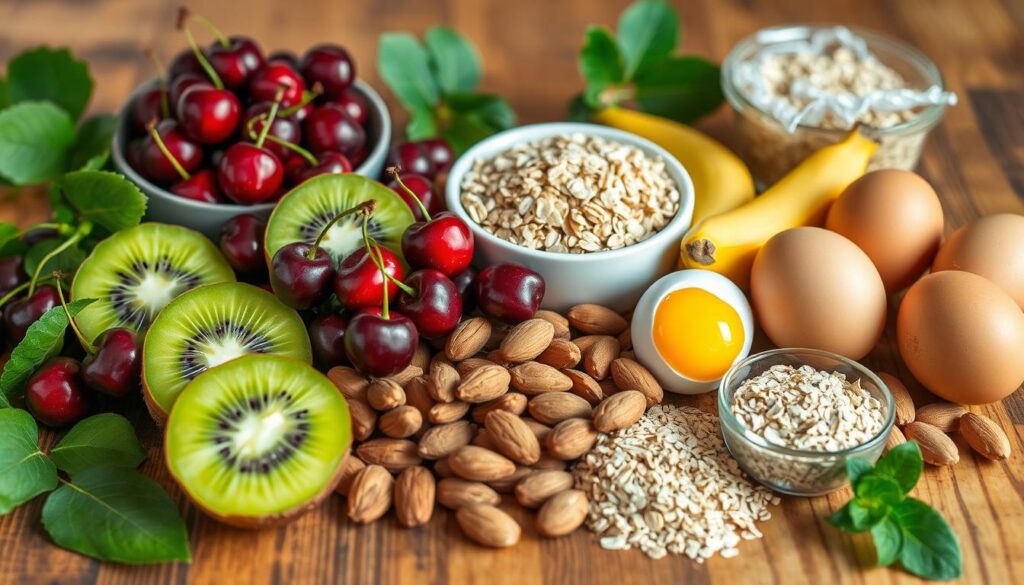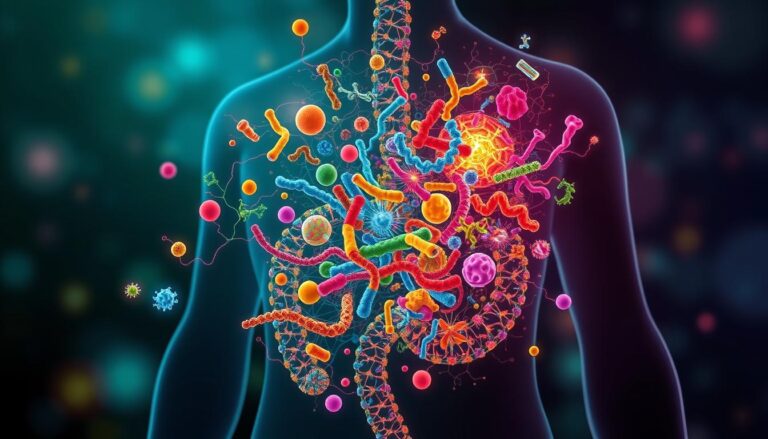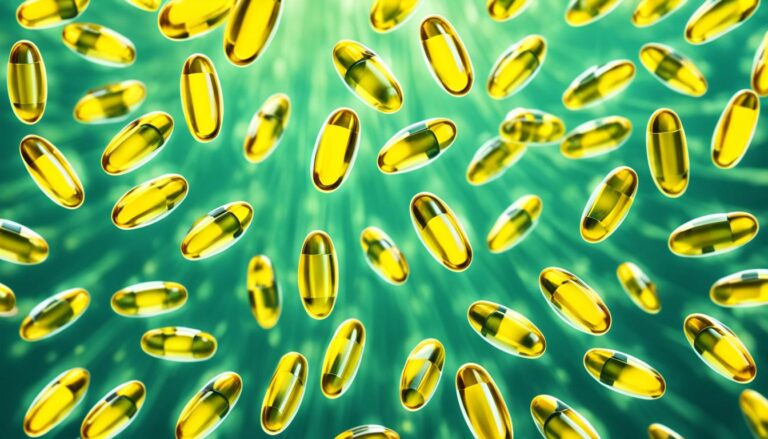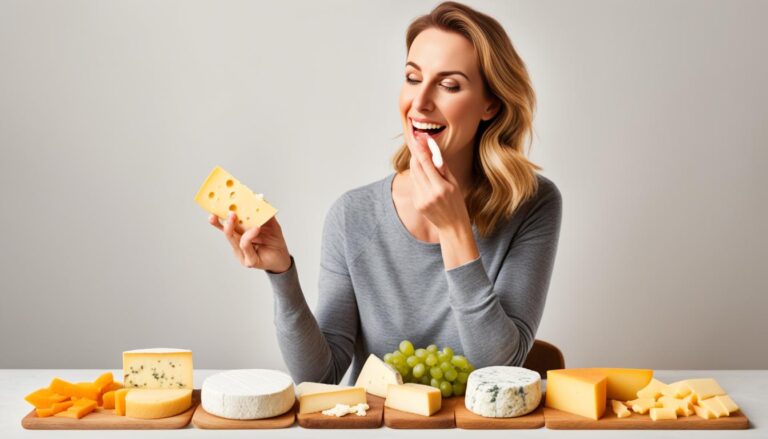Are you having trouble sleeping? You might be surprised to learn that the humble egg could help. Melatonin a hormone that helps us sleep is found in some foods including eggs.
This might be an unexpected source.
Melatonin is key for our sleep patterns. It’s made by our bodies and can also be found in certain foods. Eating foods high in melatonin could help you sleep better.
So, the big question is: Are eggs a good source of melatonin? Let’s look at the latest research to find out more about this interesting link.
Key Takeaways
- Melatonin is a sleep-regulating hormone found in some foods like eggs.
- Eating foods rich in melatonin such as eggs might help increase your melatonin levels and improve sleep.
- We don’t fully understand the link between eggs and melatonin yet. More research is needed to know how much melatonin eggs have.
- Eggs are nutritious and contain compounds like tryptophan that can help with sleep.
- Looking into eggs as a melatonin source could open new ways to improve sleep through diet.
What is Melatonin?
Melatonin is a hormone that helps control our sleep and wake times. It’s made by the pineal gland in the brain. This hormone tells our body when it’s time to sleep or be awake.
When it gets dark the pineal gland makes more melatonin. This tells our body it’s night and time to sleep. When it’s light melatonin levels go down, signaling it’s daytime and time to be awake.
This cycle of melatonin production is key for a good sleep-wake cycle. It helps us feel tired at night and alert in the morning.
Melatonin does more than help us sleep. It’s linked to brain health, eye health, and sleep restoration. Factors like age, stress, and some health conditions can affect how much melatonin our bodies make.
| Food | Melatonin Content ng/g |
|---|---|
| Pistachios | 233,000 |
| Tart Cherries | 13.46 |
| Eggs | 1.54 |
| Pineapple | 0.28 |
| Salmon | 0.21 |
| Milk | 0.12 |
| Walnuts | 0.04 |
Some foods like pistachios, tart cherries, and eggs have a lot of melatonin. Eating these foods can help your body make more of this important hormone.

Melatonin is a hormone that regulates the sleep-wake cycle produced by the pineal gland in the brain.
The Role of Melatonin in Sleep and Health
Melatonin is a hormone made by the pineal gland. It’s key for a good sleep cycle and overall health. This hormone helps with sleep quality sleep patterns, and prevents some sleep disorders like insomnia.
Melatonin keeps the body’s circadian rhythm in check. This is vital for health and feeling good. As people get older their melatonin levels go down. So older folks might need to eat more melatonin rich foods or take supplements to help with sleep restoration.
Melatonin’s Potential Health Benefits
Melatonin does more than just help you sleep. It’s good for brain health and eye health. Studies show it has antioxidant properties. These can protect egg cells and boost fertility outcomes for those using reproductive treatments.
Melatonin is a versatile hormone that plays a crucial role in regulating the sleep wake cycle and promoting overall health and well being.
If you’re having trouble sleeping, want better sleep quality, or just want to stay healthy knowing about melatonin can help. It’s a key step towards reaching your health goals.

Read more: How much protein is in 2 eggs
Are eggs a good source of melatonin?
Eggs might seem like an odd choice for a melatonin source but they’re actually quite good. They have a lot of melatonin, which helps control our sleep. Eggs have about 1.54 ng/g of melatonin, making them a top choice among animal products.
Unlike the melatonin made in our bodies, eggs offer a natural way to get more of this hormone. They have more melatonin than many other meats. This could be great for people wanting to improve their sleep naturally.
The amount of melatonin in eggs can change. This depends on when the eggs were laid and what the hens ate. We need more studies to understand how eggs affect our melatonin levels.
Eggs are a good melatonin source, but eating a balanced diet is key. Foods like pistachios, tart cherries, and salmon also boost melatonin. These foods help your body make more melatonin and improve sleep.

Eggs are a surprisingly good source of melatonin with levels that can rival those found in other animal products. This makes them a valuable addition to a sleep promoting diet.
Exploring Other Melatonin Rich Foods
Eggs are great for melatonin but there are other foods that are even better. Here are some top choices:
- Pistachios 233,000 ng/g of melatonin
- Tart cherries 13.46 ng/g of melatonin
- Pineapple 0.21 ng/g of melatonin
- Salmon 0.21 ng/g of melatonin
- Milk 0.12 pg/mL of melatonin
- Walnuts 0.04 ng/g of melatonin
Adding these melatonin-rich foods to your diet can help your body make more melatonin. This can improve your sleep health.
Other Food Sources of Melatonin
Eggs aren’t the only food that can boost your melatonin levels. There are many foods high in melatonin and natural sources of melatonin you can add to your diet. These foods help with sleep and health.
Tart cherries are a top choice for better sleep. They’re full of melatonin. Drinking tart cherry juice can raise your melatonin levels. Goji berries are also packed with this hormone.
Fatty fish like salmon and tuna are great for sleep. They have melatonin and omega-3 fatty acids. Pistachios are another melatonin rich snack you can easily eat.
Milk, yogurt rice, and oats have some melatonin too. Mushrooms, especially shiitake and portobello are also good for sleep.
Adding these foods high in melatonin to your meals and snacks can help increase your melatonin. This supports better sleep and health.

Read more: How Lack of Sleep Impacts Weight Loss Efforts
Eating a balanced nutrient-rich diet is one of the most effective natural ways to ensure your body has the resources it needs to produce adequate melatonin and maintain a healthy sleep wake cycle.
Incorporating Melatonin Rich Foods into Your Diet
Eating foods high in melatonin can help your body make more of this sleep hormone. Foods like eggs tart cherries fatty fish nuts, and milk can boost your melatonin levels. This way, you can get more sleep help without just using supplements.
These foods are not only good for melatonin but also for other nutrients that help with sleep. But think about when you eat them. Some foods like citrus fruits and spicy foods might keep you awake if eaten before bed.
Good sleep habits, like going to bed at the same time every night and avoiding blue light before sleep, also help. They make the melatonin in your diet work better for you.
Melatonin-Rich Food Options
- Eggs A rich source of melatonin as well as essential nutrients like protein and iron.
- Tart Cherries One of the best natural sources of melatonin helping to improve sleep quality.
- Fatty Fish e.g. salmon sardines High in melatonin and omega-3 fatty acids which can enhance sleep duration and quality.
- Nuts e.g. pistachios almonds Contain significant amounts of melatonin and other beneficial nutrients.
- Milk Provides tryptophan a precursor to melatonin making it a natural sleep aid.

Read more: Lose weight in 2026 without dieting 5 tricks
Adding these foods to your diet is good, but remember they don’t have as much melatonin as supplements. A good mix of diet and supplements can help you sleep well.
Factors Affecting Melatonin Levels in Foods
Many factors can change the melatonin levels in foods. Knowing these can help people pick foods high in melatonin. This can lead to better sleep.
The time of day the food was made matters a lot. For example, milk from cows milked at night has more melatonin. This is because cows make more melatonin when it’s dark.
What the animals eat also affects melatonin levels. Eggs have different melatonin levels based on when the hens laid them and what they ate.
How food is processed can also change its melatonin levels. Roasting or cooking can affect how much melatonin is in the food.
| Factor | Impact on Melatonin Levels |
|---|---|
| Time of Day | Night-time milk and eggs tend to have higher melatonin levels |
| Animal Diet | Variations in the diet of dairy cows and hens can affect melatonin content |
| Food Processing | Cooking and other processing methods may impact melatonin availability |
Understanding these factors helps people choose better foods. This can lead to more melatonin and better sleep and health.
Melatonin is a powerful natural antioxidant, and its production is closely linked to the body’s sleep wake cycle. Maximizing our intake of melatonin-rich foods can be a holistic approach to promoting better sleep and overall well being.
Melatonin Supplements vs Dietary Sources
Melatonin supplements are easy to find and often used to help with sleep. But getting melatonin from food might be a better choice for your health. Supplements can make you feel sleepy during the day irritable or give you headaches if you take too much or at the wrong time.
On the other hand, eating foods like eggs, tart cherries, fatty fish and nuts can give you melatonin naturally. This can lead to better sleep without the bad side effects of supplements. These foods also have other nutrients that help with sleep and health.
Melatonin Rich Foods to Incorporate
- Milk rich in tryptophan, which can increase melatonin and serotonin levels to aid sleep.
- Pistachios containing higher melatonin content compared to other nuts as well as vitamin B6 essential for melatonin conversion.
- Tart cherries and cherry juice high in melatonin and anti-inflammatory compounds, can enhance sleep quality.
- Fatty fish like salmon and tuna, providing melatonin, vitamin D, omega-3 fatty acids, and magnesium to promote improved sleep.
- Oats, a great source of melatonin and tryptophan, high in fiber, B vitamins, and minerals, aiding in restful sleep.
- Mushrooms, containing melatonin and tryptophan, as well as proteins, fiber, and antioxidants that support sleep and overall health.
Eating these natural sleep aids can be a healthier way to improve your sleep and well being. It’s better than just using melatonin supplements.
Consumption of salmon three times per week for five months was associated with a positive impact on sleep and daily functioning based on a small 2014 randomized trial.
Sleep Hygiene and Other Lifestyle Factors
Eating foods high in melatonin like eggs can help you sleep better. But it’s also important to think about other things that affect your sleep. Good sleep hygiene like having a regular sleep routine not using too much blue light before bed, and making your bedroom comfy, can make melatonin work better. This leads to better sleep.
Things like stress management physical activity, and your daily habits can also change how much melatonin your body makes and your circadian rhythm. By looking at both what you eat and how you live, you can improve your sleep quality and feel better overall.
- Establish a consistent sleep routine, going to bed and waking up at the same time each day.
- Limit exposure to blue light from electronic devices e.g. smartphones tablets computers for at least 2-3 hours before bedtime.
- Create a comfortable, dark, and cool sleep environment to promote better sleep quality.
- Engage in regular physical activity during the day to support healthy sleep patterns.
- Practice stress management techniques, such as meditation or deep breathing, to reduce the impact of stress on sleep.
| Lifestyle Factor | Impact on Sleep |
|---|---|
| Caffeine consumption | Reduces sleep quality and quantity |
| Alcohol consumption | Disrupts sleep patterns and reduces sleep quality |
| High sugar or high carbohydrate diets | Associated with poorer sleep quality |
| Skipping meals or snacking irregularly | Reduces sleep quality and quantity |
| Sedentary lifestyle | Linked to increased risk of sleep disorders |
By looking at both what you eat and how you live, you can improve your sleep and feel better overall.
Conclusion
Eggs and melatonin have a link that researchers are still exploring. But, eggs could be a good source of this hormone that helps you sleep. Adding foods high in melatonin like tart cherries, nuts, and fatty fish to your diet can help increase your melatonin levels. This can improve your sleep-wake cycle.
But remember, your sleep habits and overall lifestyle also play a big part. They can affect how well melatonin from food works for you. So it’s important to focus on good sleep habits and a healthy lifestyle too.
By making smart choices about what you eat and how you live, you can use melatonin-rich foods to better your sleep and health. These foods can be a great way to get natural sleep help or just improve your health. Adding them to your diet could lead to better sleep and a more lively energetic life.
So, why not try it out? See how different melatonin rich foods affect your sleep and health. With some trial and finding what works best for you, you might find a great natural way to wake up feeling refreshed and ready for the day.





